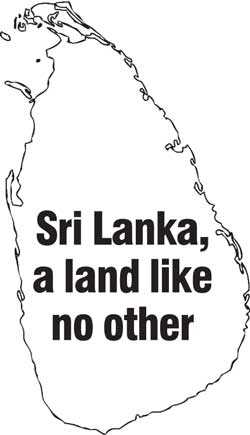Monday Feb 16, 2026
Monday Feb 16, 2026
Saturday, 11 May 2019 00:01 - - {{hitsCtrl.values.hits}}
 Sarath Fonseka waited patiently for two weeks for President Maithripala Sirisena to appoint him as the Law and Order Minister. The celebrated General who, despite serving the army for 40 years and knows the real meaning of discipline, finally succumbed to peer pressure to take on the President.
Sarath Fonseka waited patiently for two weeks for President Maithripala Sirisena to appoint him as the Law and Order Minister. The celebrated General who, despite serving the army for 40 years and knows the real meaning of discipline, finally succumbed to peer pressure to take on the President.
The General said President Sirisena had been informed of the recent terrorist attack at the Security Council (SC) for more than 15 times, but he had nodded off the repeated warnings. He told Parliament that those who had participated at the SC had confirmed the fact that the President was informed of the imminent disaster but he had not given any instructions and nodded it off.
He further said the head of state now continues to desperately seek a scapegoat even though he has maintained full control of the entire security apparatus since October 2018, indicating that he was planning to put the entire responsibility for the attacks on the two officials and wipe his hands clean of this responsibility.
This is certainly not what the country wants at this moment of time, especially when the Catholic Church is openly saying that the Easter Sunday carnage would have been averted if party politics were overcome and if the communication breakdown between the Executive, Defence Establishments and government officials did not occur.
The Catholic Bishops Conference President Bishop Winston Fernando, at a media conference last afternoon, said: “It is appropriate to convert this disaster into a turning point and thereby developing mutual trust among the people of all religions and ethnic groups in the country.”
So it is now up to the political leadership at least now to rise up to this challenge and deliver. When the Bishops were asked if they were satisfied with the role played by the Government for ensuring the safety of the Catholics after the bomb attacks, Malcolm Cardinal Ranjith said the Government is trying. “We requested the Government to search all houses in Negombo but that had not been done.”
He charged that some who were involved in the clash last Sunday had taken out swords which they had hidden under a canal. Also, he said the request made by him to close liquor shops in Negombo after the clashes last Sunday was not heeded by the Government. He said politicians should not intervene to get those who are arrested released and to stop the search operations.
Hurried visit
While the country was limping after the attack, a Sri Lankan ministerial delegation ran to Oman to meet with Oil and Gas Minister Mohamed Hameed Al Ruhmy. The delegation included controversial Minister Malik Samarawickrama, Kabir Hashim, the Minister at the centre of a big controversy Rishad Bathiudeen and Malik’s business friend BOI Chairman Mangala Yapa.
Discussions had revolved around the possibilities of forming a partnership with Oman’s Oil Refineries and Petroleum Industries Company (ORPIC) in the proposed Greenfield Oil Refinery in Hambantota.
Knowing very well that tensions were running high between the Sinhalese majority and the Muslim community, moderates in Sri Lanka are questioning the reason for this indecent hurry. The majority view now is that it was to secure the deal that was struck by Malik Samarawickrama and Silver Park International, Singapore prior to the attack.
We need a Lakshman Kadirgamar
There is very little on the outside from the Government to mobilise the enormous international support to convert the goodwill into tangible results for the country. The Minister of Foreign Affairs is not heard or seen. Friendships with in the UNP must not come in the way of the nation’s future.
The country badly needs a Kadirgamar, during the civil war he was widely respected in his role as foreign minister. If we can’t find a Kadirgamar, at least get someone close to his capability to manage our international effort. This country, the people, are all crying for Statesmanship, benevolence, decency, respect for human rights and competence, nobody cares whether he or she comes from civil society, clergy or the private sector.